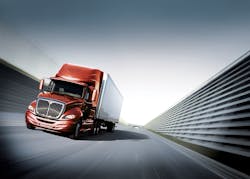Navistar International is switching its 2010 EPA emissions strategy to a selective catalytic reduction (SCR) system. During a morning investor conference call, Daniel C. Ustian, chairman, president & CEO, made the announcement that the company would be adding “urea-based aftertreatment” to its Advanced Exhaust Gas Recirculation (EGR) technology to allow its engines to meet emissions standards of 0.20 grams of NOx. The new solution, to be available in early 2013, the company said, will be called ICT+ (in-cylinder technology plus).
The formal announcement follows a week of rumors that Navistar, which has had trouble getting its EGR-only engines to meet the 2010 standards, would be switching to the technology path chosen by all its competitors. While not using the term SCR specifically, Ustian said the announcement is part of effort "to get the product side back on track” to meet strategic goals and that the company “anticipates moving forward on development of its EGNR” solid state aftertreatment system but will “add [liquid-based] technology to it.”
Seperately Steve Schrier, Navistar's manager-corporate communications, confirmed that the liquid urea would be diesel emissions fluid (DEF), the same fluid used by all the other OEMs selling heavy-duty diesels in North America. Asked to comment on reports in The Wall Street Journal and other media outlets that Navistar might add Cummins Engines diesels with SCR to its product offerings, he said: "We remain committed to the integrated powertrain strategy with our MaxxForce engines."
Competitors have said since the start that Navistar could not meet the 2010 standards using EGR only. Ustian said that this new solution has the full support of both the EPA and California Air Resources Board (CARB) and will position the company to meet greenhouse gas (GHG) rules in advance of 2014 and 2017 requirements.
“We actually have trucks [with ICT+] running now and we realize we are looking at the key to meeting 2014 and 2017 GHG standards early,” said Troy Clarke, president-truck and engine.
ICT+ technology is being launched in a mid-range vehicle in Brazil this week, Ustian said. It uses a combination of air, fuel and control modules in-cylinder along with a liquid-based aftertreatment (urea), solid state aftertreatment (EGNR) and reformer. The company added that the new technology will add some costs to the vehicles, but Navistar told investors it expects “there will be some opportunity to offset these costs with pricing.”
The first engine with the new ICT+ technology will be the 13L in early 2013 followed by a 15L and 11L, the company said. The benefits to customers are that the “engines stay the same,” Ustian pointed out. “They are identical to those we sell today, but will gain fuel economy with aftertreatment. And we anticipate adding more fuel economy as we further develop them.”
Clarke added that Navistar will use a combination of credits and non-compliance penalties (NCPs) during the transition period to the new engine.
“We’ve been assured by EPA and CARB that they are willing to engage immediately in review of engine performance, certification time line and discussion of maintaining uninterrupted sales during the transition,” Clarke said. “This isn’t about backing up; it’s about going forward delivering the cleanest engines and the most efficient engines.”
Those NCPs were the subject of a lawsuit brought by Cummins Inc.; Daimler Trucks North America and its subsidiary Detroit Diesel; and by sister OEMs Mack Trucks and Volvo Trucks North America, in a suit against the EPA after that agency announced Navistar would be allowed to pay penalties for non-compliant engines following the expiration of emissions credits.
EPA set forth an interim final rule (IFR) to set those penalties, although the U.S. Court of Appeals for the District of Columbia Circuit ruled last month that the EPA jumped the gun in its decision.
“In January 2012, EPA promulgated an interim final rule (IFR) to permit manufacturers of heavy-duty diesel engines to pay nonconformance penalties (NCPs) in exchange for the right to sell noncompliant engines,” stated circuit Judge Janice Rogers Brown in her written opinion.
“EPA took this action without providing formal notice or an opportunity for comment, invoking the ‘good cause’ exception provided in the Administrative Procedure Act (APA),” Judge Brown continued. “Because we find that none of the statutory criteria for ‘good cause’ are satisfied, we vacate the IFR.”
In its second-quarter earnings statement, Navistar posted a $172 million quarter loss, $104 million of which was related to warranty costs related to 2010 and 2011 engines using Advanced EGR, it said.
